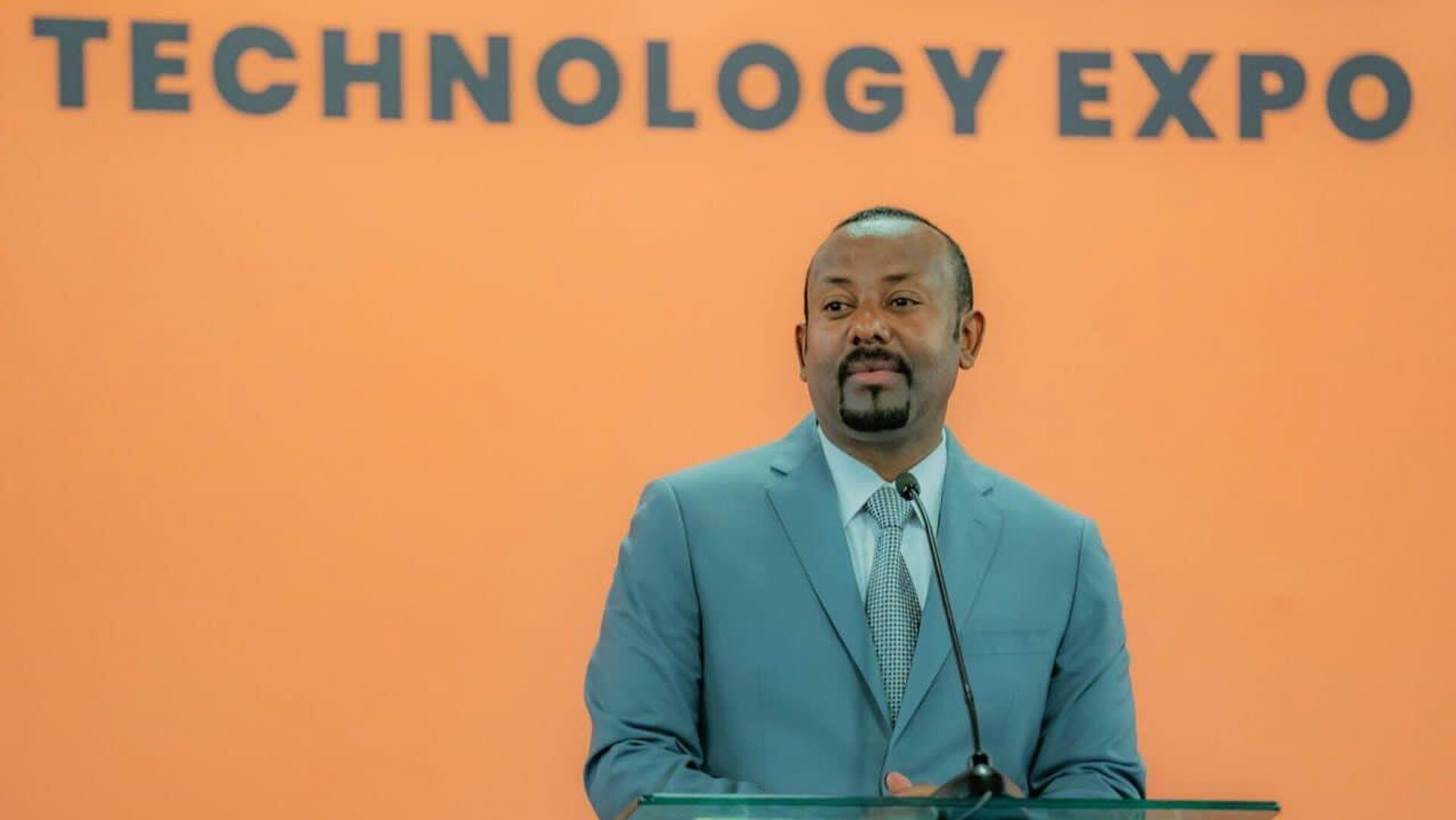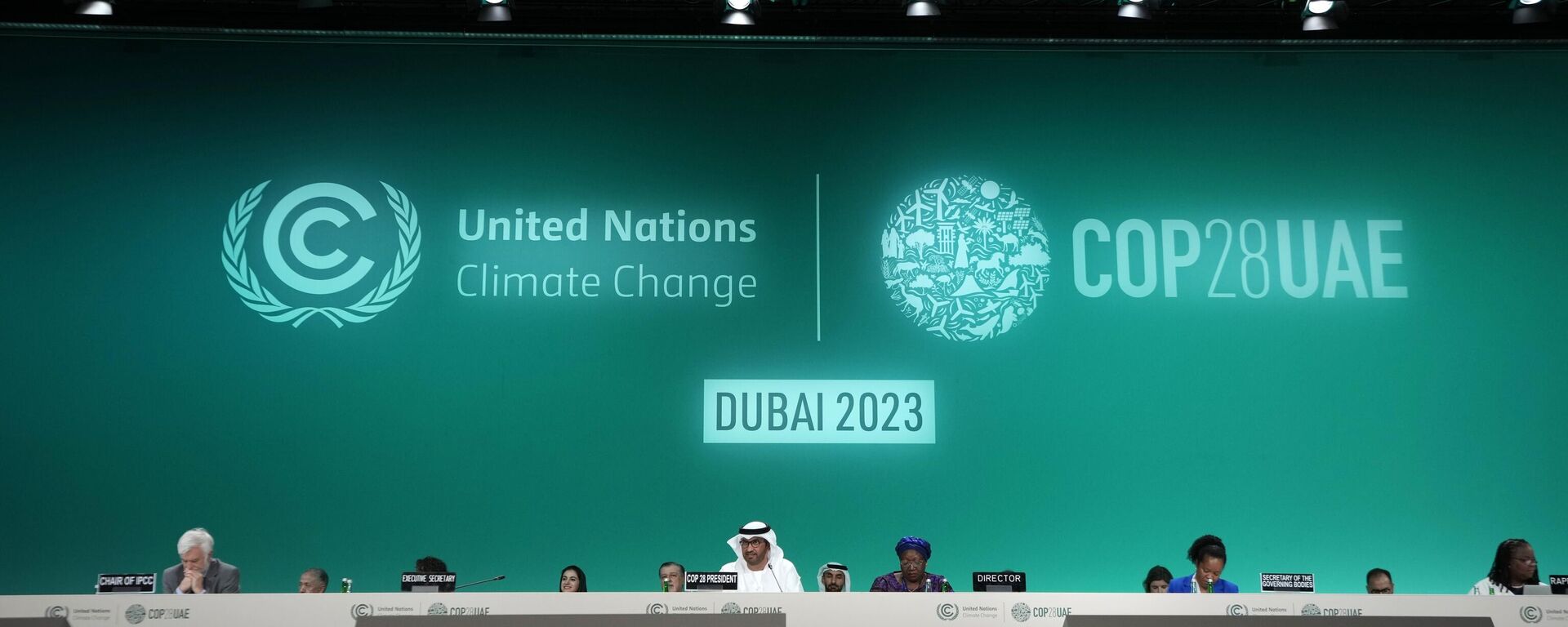https://en.sputniknews.africa/20231202/debt-ridden-countries-cant-fight-climate-change-ethiopias-prime-minister-tells-cop28-1063914381.html
Debt-Ridden Countries Can't Fight Climate Change, Ethiopia's Prime Minister Tells COP28
Debt-Ridden Countries Can't Fight Climate Change, Ethiopia's Prime Minister Tells COP28
Sputnik Africa
COP28, a UN conference devoted to climate change, is taking place in the UAE from November 30 to December 12. It is anticipated to bring together more than... 02.12.2023, Sputnik Africa
2023-12-02T18:48+0100
2023-12-02T18:48+0100
2023-12-02T18:48+0100
sub-saharan africa
ethiopia
cop28 in uae
climate change
east africa
united nations (un)
united arab emirates (uae)
debt relief
debt restructuring
debt
https://cdn1.img.sputniknews.africa/img/07e7/0c/02/1063917947_0:0:1280:721_1920x0_80_0_0_1684bae1fd80cac544bea95db31acd19.jpg
Ethiopia's Prime Minister Abiy Ahmed Ali criticized the global financial system and said that no nation can successfully address the climate crisis if debt is a burden.He urged all countries to "come up with innovative outcomes" in order to battle climate change.Ahmed acknowledged that the world has made "good strides" in fighting the problem, however still being far from the 1.5℃ global target.Further, the Ethiopia's prime minister shared with the audience some "concrete examples of action" that his country has made to implement its commitment to the Paris Agreement, reminding that Africa remains highly exposed to the impact of climate change despite contributing to the issue the least.Thus, Ethiopia’s Green Legacy Initiative launched in 2019 has led to establishment of 130,000 nurseries across the East African country and annual mobilization of millions of people in seedling planting and seedling management.This "initiative has received remarkable success by planting 32.5 billion seedlings" over the past five years, the prime minister noted. Its goal is to plant 50 billion by 2026.This initiative, according to Ahmed, can further play a crucial role in Africa and support other projects like the Great Green Wall and the Africa Forest Landscape Initiative.Speaking of actions to transform the food system, the minister mentioned the successful interventions, planting a variety of drought tolerant crops and utilizing climate smart irrigation-based technology, including the nation’s wheat development program.According to the prime minister, due to this program, the nation is no longer dependent on wheat imports and is now a wheat exporting country.Moreover, Ethiopia expanded the cultivation of perennial crops and fruits and is increasing supply of poultry dairy and livestock and honey through a program called Yelemat Tirufat in order to promote "nutrition sensitive agriculture."Ahmed also mentioned that the government is encouraging eco-friendly and resource efficient greening and farming methods, effective water management, prioritizing of investment in irrigation systems based on renewable energy, saying that "Ethiopia has a potential to generate over 60,000 megawatts of clean energy by expanding hydropower, solar, wind and geothermal sources."Lastly, he talked about the successes in transport sector. The nation implemented laws to promote the use of electrical vehicles, which decreased the macroeconomic cost of importing petroleum and led to a "sharp" growth in the number of hybrid and electric automobiles on the roads.Similarly, the state-owned airline Ethiopian Airlines is "modernizing its fleet by acquiring new energy efficient aircraft". Furthermore, the country has electrified railways, expanding non-motorized transport infrastructure as well as the public transport.Perhaps, the Loss and Damage Fund launched at the COP28 on Thursday would help Ethiopia and other vulnerable countries overcome the aftermath of climate change.According to a recent UN analysis, developing counties need to receive up to $387 billion a year to adapt to changes brought on by climate change.
https://en.sputniknews.africa/20231201/loss-and-damage-fund-is-launched-at-cop28-to-help-developing-countries-battle-climate-change-1063891675.html
ethiopia
east africa
united arab emirates (uae)
Sputnik Africa
feedback@sputniknews.com
+74956456601
MIA „Rossiya Segodnya“
2023
Christina Glazkova
https://cdn1.img.sputniknews.africa/img/07e7/0b/07/1063380906_0:0:673:674_100x100_80_0_0_79628b4d0cd9f29291a57aa13bbf9e7a.jpg
Christina Glazkova
https://cdn1.img.sputniknews.africa/img/07e7/0b/07/1063380906_0:0:673:674_100x100_80_0_0_79628b4d0cd9f29291a57aa13bbf9e7a.jpg
News
en_EN
Sputnik Africa
feedback@sputniknews.com
+74956456601
MIA „Rossiya Segodnya“
Sputnik Africa
feedback@sputniknews.com
+74956456601
MIA „Rossiya Segodnya“
Christina Glazkova
https://cdn1.img.sputniknews.africa/img/07e7/0b/07/1063380906_0:0:673:674_100x100_80_0_0_79628b4d0cd9f29291a57aa13bbf9e7a.jpg
ethiopia, cop28 in uae, climate change, east africa, united nations (un), united arab emirates (uae), debt relief, debt restructuring, debt, abiy ahmed
ethiopia, cop28 in uae, climate change, east africa, united nations (un), united arab emirates (uae), debt relief, debt restructuring, debt, abiy ahmed
Debt-Ridden Countries Can't Fight Climate Change, Ethiopia's Prime Minister Tells COP28
Christina Glazkova
Writer / Editor
COP28, a UN conference devoted to climate change, is taking place in the UAE from November 30 to December 12. It is anticipated to bring together more than 70,000 attendees.
Ethiopia's Prime Minister Abiy Ahmed Ali criticized the global financial system and said that no nation can successfully address the climate crisis if debt is a burden.
"No country can effectively confront the climate challenge if debt is a burden. This is why the G20 must work to implement bolder and timely debt relief plans to help the most affected countries overcome debt distress, address climate change, and pursue more equitable and sustainable economic growth objectives," he said at the 28th Conference of the Parties of the UNFCCC (COP28) on Friday.
He urged all countries to "come up with innovative outcomes" in order to battle climate change.
Ahmed acknowledged that the world has made "good strides" in fighting the problem, however still being far from the
1.5℃ global target.
Further, the Ethiopia's prime minister shared with the audience some "concrete examples of action" that his country has made to implement its commitment to the
Paris Agreement, reminding that Africa remains highly exposed to the impact of climate change despite contributing to the issue the least.
Thus, Ethiopia’s Green Legacy Initiative launched in 2019 has led to establishment of 130,000 nurseries across the East African country and annual mobilization of millions of people in seedling planting and seedling management.
“Our Green Legacy Initiative represents a proactive response to pressing environmental and socio-economical challenges. It reduces carbon emission, preserves our bio-diversity, creates jobs and boosts sectors such as tourism,” Ahmed stated.
This "initiative has received remarkable success by planting 32.5 billion seedlings" over the past five years, the prime minister noted. Its goal is to plant 50 billion by 2026.
The premier also mentioned that Ethiopia’s Green Legacy Initiative will be the biggest afforestation project in the world when finished.
This initiative, according to Ahmed, can further play a crucial role in Africa and support other projects like the Great Green Wall and the Africa Forest Landscape
Initiative.
Speaking of actions to transform the food system, the minister mentioned the successful interventions, planting a variety of drought tolerant crops and utilizing climate smart irrigation-based technology, including the nation’s wheat development program.
"Noteworthy is our national wheat production program, whereby we produce 6 million hectares in one year, making Ethiopia the largest wheat producer in Africa," Ahmed announced.
According to the prime minister, due to this program, the nation is no longer dependent on
wheat imports and is now a wheat exporting country.
Moreover, Ethiopia expanded the cultivation of perennial crops and fruits and is increasing supply of poultry dairy and livestock and honey through a program called Yelemat Tirufat in order to promote "nutrition sensitive agriculture."
Ahmed also mentioned that the government is encouraging eco-friendly and resource efficient greening and farming methods, effective water management, prioritizing of investment in irrigation systems based on renewable energy, saying that "Ethiopia has a potential to generate over 60,000 megawatts of clean energy by expanding hydropower, solar, wind and geothermal sources."
"The nation’s target to triple the current power generation capacity and double energy utilization efficiency by 2030, the country will achieve universal access to electricity, minimize dependency on biomass fuel and provide the opportunity for industries to reach net-zero targets by 2050," the official said.
Lastly, he talked about the successes in transport sector. The nation implemented laws to promote the use of electrical vehicles, which decreased the macroeconomic cost of importing petroleum and led to a "sharp" growth in the number of hybrid and electric automobiles on the roads.
Similarly, the state-owned airline Ethiopian Airlines is "modernizing its fleet by acquiring new energy efficient aircraft". Furthermore, the country has electrified railways, expanding non-motorized transport infrastructure as well as the public transport.
The prime minister's statement regarding the inability of debt-ridden countries to combat climate change comes amid the $1.5 billion reduction of Ethiopian debt. Such a move reportedly eases Ethiopia's financial load as it seeks a wider funding scheme.
Perhaps, the Loss and Damage Fund launched at the
COP28 on Thursday would help Ethiopia and other vulnerable countries overcome the aftermath of climate change.
According to a
recent UN analysis, developing counties need to receive
up to $387 billion a year to adapt to changes brought on by climate change.



